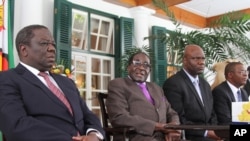WASHINGTON DC —
Zimbabwe has officially appealed for over $200 million from the United Nations Development Program (UNDP) for the running of elections and the constitutional referendum this year.
In a letter to UNDP country representative Alain Noudehou, dated February 4, Finance Minister Tendai Biti and Justice Minister Patrick Chinamasa said the perennially impoverished government only has $25 million out of the $250 million needed for the two plebiscites.
“On behalf of the Government of Zimbabwe, we formally request the UNDP for assistance in mobilizing resources to cover for the funding gap for both the constitutional referendum and the general elections,” the letter reads in part.
The country is now poised for a national referendum after the long-delayed draft charter sailed through both the House of Assembly and the Senate this week.
But the ruling partners have yet to set a date for the public vote, widely expected to approve the constitution and lead to general elections later this year.
Three years of political bickering between Zanu PF and the MDC had threatened to unravel the constitutional reform agenda, but a surprise compromise last month led to a breakthrough.
The UNDP and its supporting partners picked the tab for the new constitution exercise, and now government hopes the United Nations agency can come to its rescue one more time.
“It is our hope that a formal structure in respect to the referendum and the elections, between yourselves and government be set up, similar to the project board that dealt with the constitution-making process,” wrote Biti and Chinamasa in the appeal letter.
Meanwhile, the constitutional select committee said it is elated that its $3.6 million budget to move the constitution-making process to the next level was Thursday approved by the project board comprising representatives from the donor organisations under the UNDP and the government.
COPAC co-chairman Douglas Mwonzora of the Movement for Democratic Change formation led by Prime Minister Morgan Tsvangirai said the money will be used to educate Zimbabweans on the draft charter, including the translation of materials into all local languages ahead of the referendum.
In a letter to UNDP country representative Alain Noudehou, dated February 4, Finance Minister Tendai Biti and Justice Minister Patrick Chinamasa said the perennially impoverished government only has $25 million out of the $250 million needed for the two plebiscites.
“On behalf of the Government of Zimbabwe, we formally request the UNDP for assistance in mobilizing resources to cover for the funding gap for both the constitutional referendum and the general elections,” the letter reads in part.
The country is now poised for a national referendum after the long-delayed draft charter sailed through both the House of Assembly and the Senate this week.
But the ruling partners have yet to set a date for the public vote, widely expected to approve the constitution and lead to general elections later this year.
Three years of political bickering between Zanu PF and the MDC had threatened to unravel the constitutional reform agenda, but a surprise compromise last month led to a breakthrough.
The UNDP and its supporting partners picked the tab for the new constitution exercise, and now government hopes the United Nations agency can come to its rescue one more time.
“It is our hope that a formal structure in respect to the referendum and the elections, between yourselves and government be set up, similar to the project board that dealt with the constitution-making process,” wrote Biti and Chinamasa in the appeal letter.
Meanwhile, the constitutional select committee said it is elated that its $3.6 million budget to move the constitution-making process to the next level was Thursday approved by the project board comprising representatives from the donor organisations under the UNDP and the government.
COPAC co-chairman Douglas Mwonzora of the Movement for Democratic Change formation led by Prime Minister Morgan Tsvangirai said the money will be used to educate Zimbabweans on the draft charter, including the translation of materials into all local languages ahead of the referendum.














